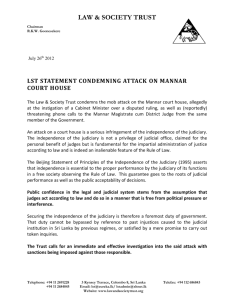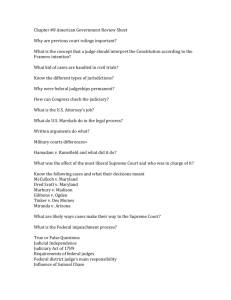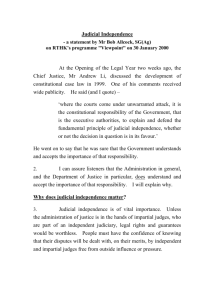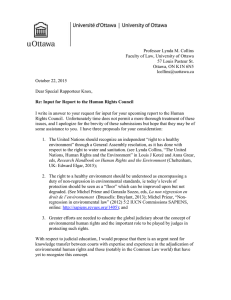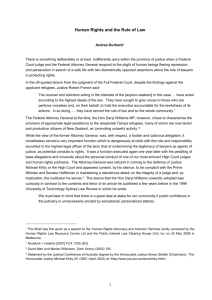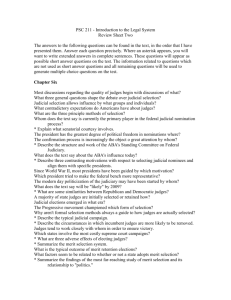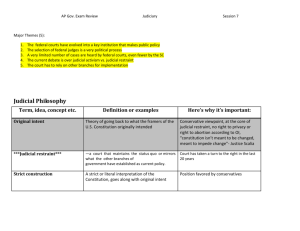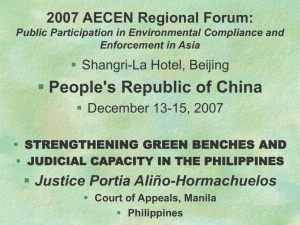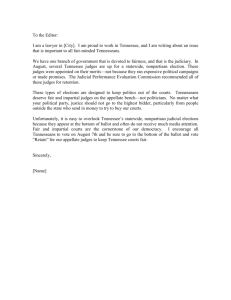Reforming the Judicial Apparatus
advertisement
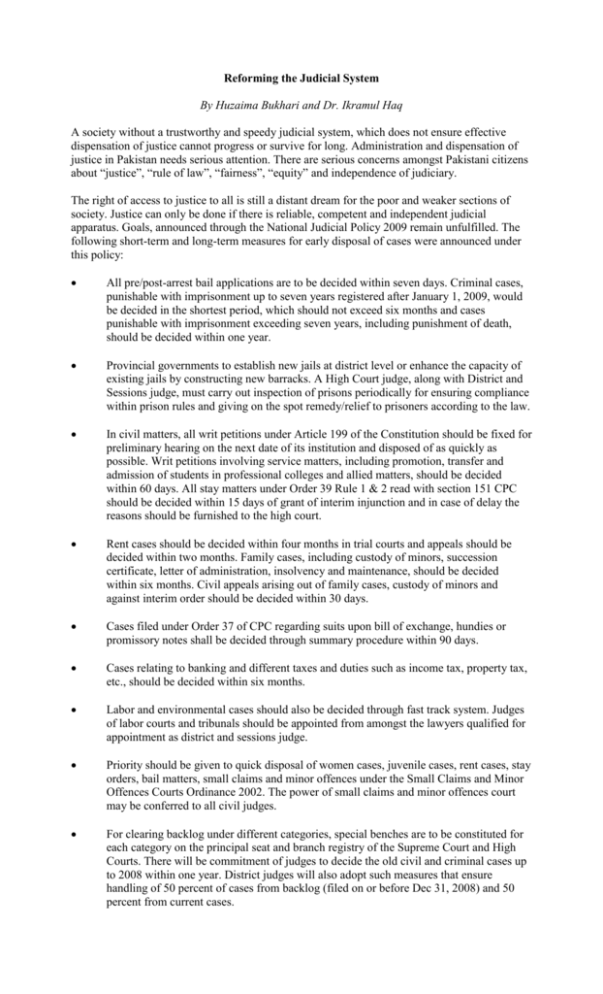
Reforming the Judicial System By Huzaima Bukhari and Dr. Ikramul Haq A society without a trustworthy and speedy judicial system, which does not ensure effective dispensation of justice cannot progress or survive for long. Administration and dispensation of justice in Pakistan needs serious attention. There are serious concerns amongst Pakistani citizens about “justice”, “rule of law”, “fairness”, “equity” and independence of judiciary. The right of access to justice to all is still a distant dream for the poor and weaker sections of society. Justice can only be done if there is reliable, competent and independent judicial apparatus. Goals, announced through the National Judicial Policy 2009 remain unfulfilled. The following short-term and long-term measures for early disposal of cases were announced under this policy: All pre/post-arrest bail applications are to be decided within seven days. Criminal cases, punishable with imprisonment up to seven years registered after January 1, 2009, would be decided in the shortest period, which should not exceed six months and cases punishable with imprisonment exceeding seven years, including punishment of death, should be decided within one year. Provincial governments to establish new jails at district level or enhance the capacity of existing jails by constructing new barracks. A High Court judge, along with District and Sessions judge, must carry out inspection of prisons periodically for ensuring compliance within prison rules and giving on the spot remedy/relief to prisoners according to the law. In civil matters, all writ petitions under Article 199 of the Constitution should be fixed for preliminary hearing on the next date of its institution and disposed of as quickly as possible. Writ petitions involving service matters, including promotion, transfer and admission of students in professional colleges and allied matters, should be decided within 60 days. All stay matters under Order 39 Rule 1 & 2 read with section 151 CPC should be decided within 15 days of grant of interim injunction and in case of delay the reasons should be furnished to the high court. Rent cases should be decided within four months in trial courts and appeals should be decided within two months. Family cases, including custody of minors, succession certificate, letter of administration, insolvency and maintenance, should be decided within six months. Civil appeals arising out of family cases, custody of minors and against interim order should be decided within 30 days. Cases filed under Order 37 of CPC regarding suits upon bill of exchange, hundies or promissory notes shall be decided through summary procedure within 90 days. Cases relating to banking and different taxes and duties such as income tax, property tax, etc., should be decided within six months. Labor and environmental cases should also be decided through fast track system. Judges of labor courts and tribunals should be appointed from amongst the lawyers qualified for appointment as district and sessions judge. Priority should be given to quick disposal of women cases, juvenile cases, rent cases, stay orders, bail matters, small claims and minor offences under the Small Claims and Minor Offences Courts Ordinance 2002. The power of small claims and minor offences court may be conferred to all civil judges. For clearing backlog under different categories, special benches are to be constituted for each category on the principal seat and branch registry of the Supreme Court and High Courts. There will be commitment of judges to decide the old civil and criminal cases up to 2008 within one year. District judges will also adopt such measures that ensure handling of 50 percent of cases from backlog (filed on or before Dec 31, 2008) and 50 percent from current cases. For conducting elections, the services of judiciary in future will not be available. The focus of judiciary would be on disposal of cases to redress grievances of the people by dispensation of justice. If the government feels that the election should be held under the supervision of the judiciary, then a request may come and the NJPMC would decide as to what extent and in what form help can be extended in the conduct of elections. Most of the goals set in Judicial Policy have not been implemented within the last two years. The huge back log still persists. There are no visible signs of improvement in the working of court system. Unless causes of litigation are removed, the system will remain choked. More and more judges will be required for coping with the ever increasing number of cases at all levels. Everybody is totally dissatisfied with the existing socio-economic structure, which is the main root-cause of litigation. Those imparting justice complain of lack of facilities and huge number of cases with the complainants crying for early orders but having to wait for years (sometimes decades), and the government keeps on worrying about the blockade of colossal amount of money because of slow litigation process. The first and foremost need is ensuring socio-economic justice. Justice system cannot be improved in isolation. It is part and parcel of an ailing system. The slogan of “independence” of judiciary is meaningless if divorced from empowering the weak and less privileged. The costly litigation process works against the poor and favors the rich. Justice, therefore, can only be done if there is economic equality. Separation of judiciary from administration is Constitutional command, but enforcement of Article 10A requires providing justice to all without any hindrance. The right of access to justice to all is a well-recognized inviolable privilege — now reemphasised under Article 10A inserted by the 18th Constitutional Amendment — enshrined in the Constitution. It concludes “the right to be treated according to law, the right to have a fair and proper trial and the right to have an impartial court or tribunal.”


